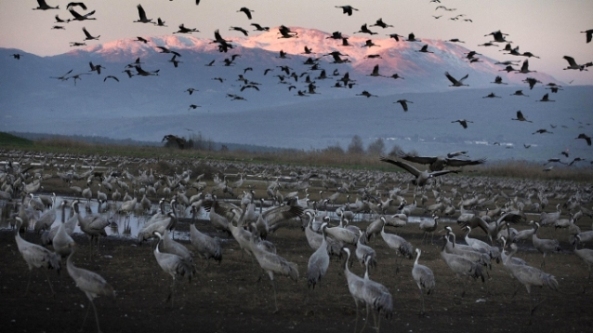Israel Restores Wetlands; Birds Make It Their Winter Home
Feb 27, 2013

Cranes fly at sunset above the Hula Valley, Northern Israel in January. Menahem Kahana/AFP/Getty Images
Like many countries, Israel tried to drain many of its swamplands, then realized it was destroying wildlife habitats. So the country reversed course, and has been restoring the wetlands of the Hula Valley in the north.
The effort has had a huge and rather noisy payoff. Unlike many birding sites, where the creatures take off when you approach them, you can practically touch the cranes that inhabit the Hula Valley.
The thousands upon thousands of the common cranes are about as tall as a toddler and have a 6-foot wingspan. They seem unperturbed by the sudden arrival of hundreds of gawking tourists, riding in what amounts to a grandstand on wheels.
The grandstand is pulled by a noisy tractor. The driver is a young tour guide. She's explaining that these birds fly thousands of miles from Europe and Asia, stopping here in the Hula Valley for rest and fuel before they head to Africa.
Each time the tractor stops, the din of the birds takes over. They coo and gurgle, while the tourists make their own appreciative noises. Why aren't these normally timid birds taking to the air? Well, they associate these big wagons, and the tractors, with food.
Restoring The Wetlands
In the 1990s, as Israel started to restore this marsh, more cranes began to stop here; many decided to spend the winter. They started to eat local crops — especially peanuts. Biologist Omri Bonneh, with the Jewish National Fund, says the farmers didn't like that.
Read the full article here.



